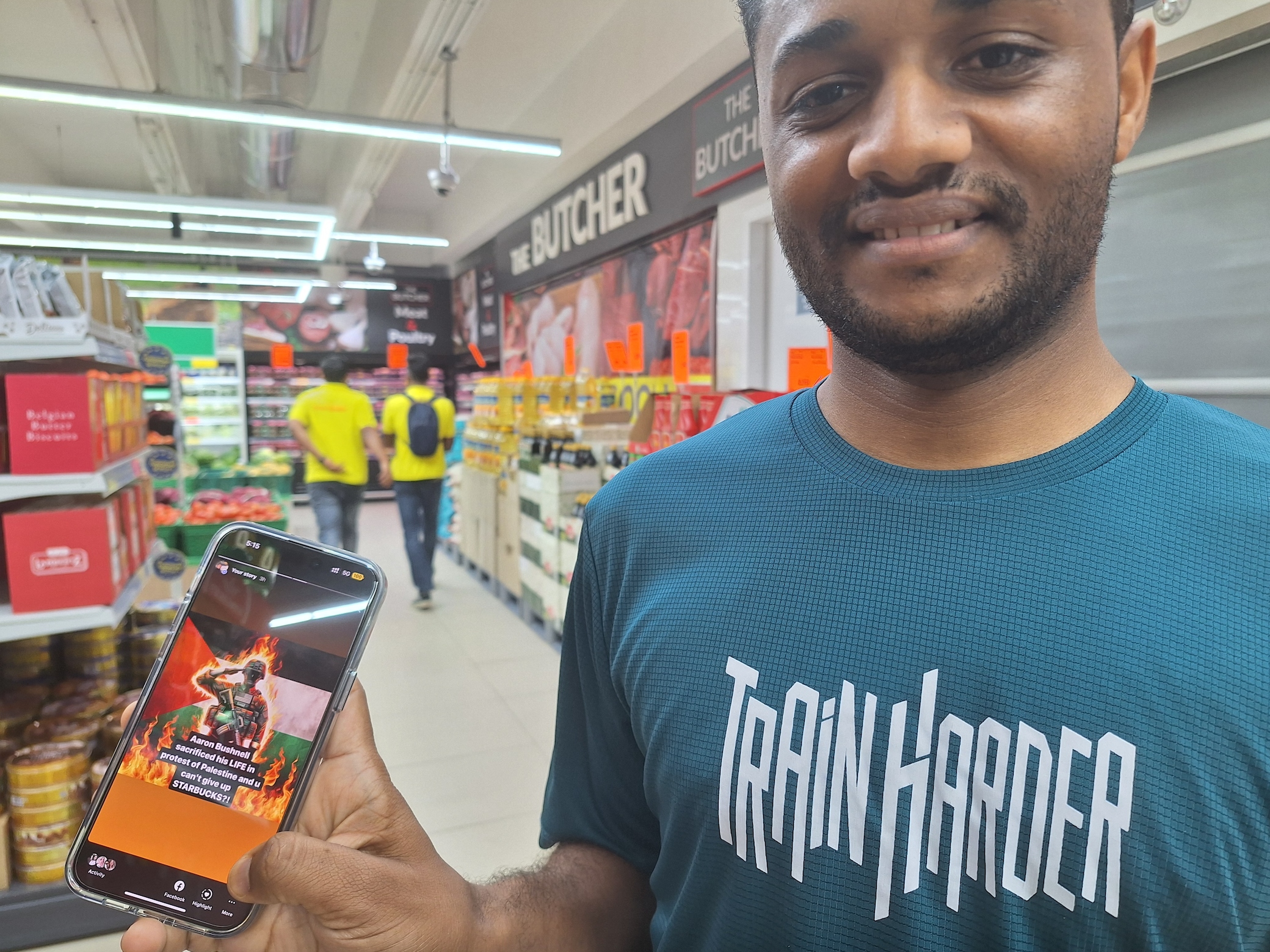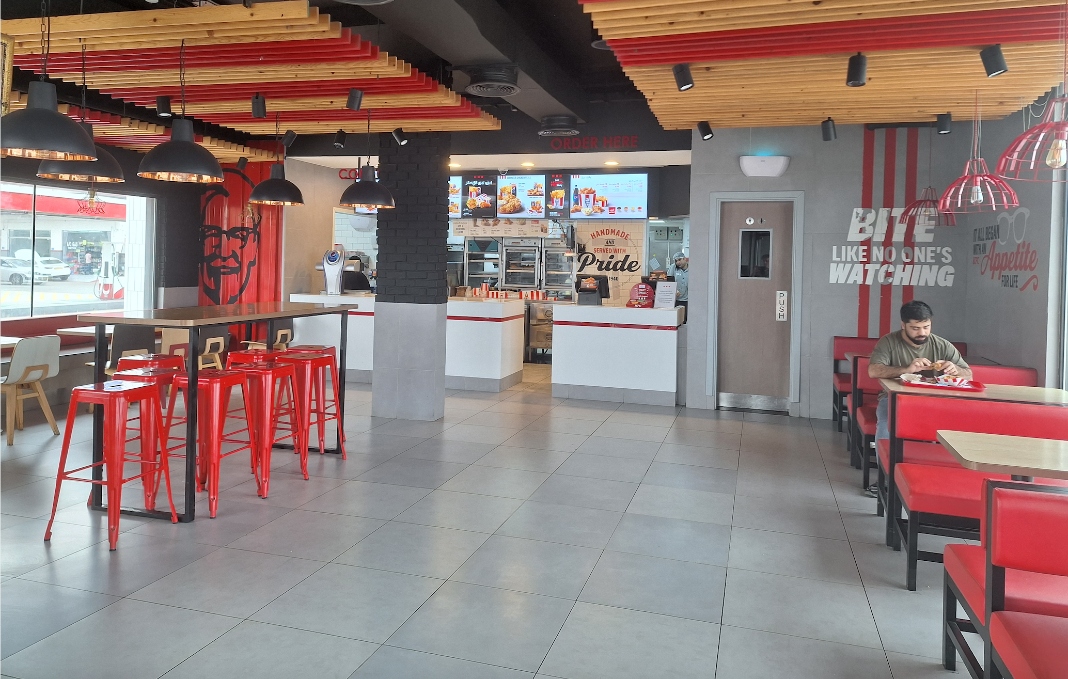Gaza war: Omanis boycott western brands and fast-food chains as many turn against West

Since the war in Gaza began in October, Mohammed Hamed has not touched a drop of his favourite soft drink, Mountain Dew.
"I used to drink Mountain Dew almost every day, a day would not go without it, but now I have stopped," he told Middle East Eye.
As an Omani who is committed to boycotting western goods over the support of the US and its allies for Israel in its war on Gaza, he now buys Thai drinks and Kinsa, a Saudi drink brand.
He has also changed his shopping habits, and now boycotts western supermarkets in Oman in solidarity with the Palestinians.
"I have never stepped inside a Carrefour since the war started," he said, referring to the French hypermarket chain that has three stories in Muscat.
New MEE newsletter: Jerusalem Dispatch
Sign up to get the latest insights and analysis on Israel-Palestine, alongside Turkey Unpacked and other MEE newsletters
The boycott campaign in Oman since the start of the Israeli war on Gaza has led to a drop in sales for major US companies including McDonald's and Starbucks, and the emergence of alternative consumer brands sourced from non-western and Muslim countries.
Hamed said he is a boycott activist and showed MEE his phone with a post he recently created featuring an illustration of Aaron Bushnell, the US Air Force serviceman who died after setting himself on fire outside the Israeli embassy in Washington DC on 25 February in a protest at US support for Israel's actions in Gaza.
The post says: "Aaron Bushnell sacrificed his life in protest of Palestine and you can't give up Starbucks!"
"I am going too deep with this situation, I'm starting to get crazy, because I see a lot of videos [from Gaza]. There is a lot of suffering happening there," said Hamed.
Like many Omanis, Hamed began a consumer boycott of western goods in October, and he's still doing it nearly five months later.
"Most of my family and friends are fed up already [with the boycott], but I'm doing my best to boycott as much as I can."
He now shops at Viva, a supermarket chain that specialises in offering alternatives to western brands, stocking washing liquid from China and Malaysia and snacks and drinks from Saudi Arabia.
Non-western brands preferred
An Omani government source said the boycott movement had begun early in the war and was spontaneous rather than organised: "Most of the Omanis were active in the boycott movement.
"There is a shift in the market, in every consumer product in your [daily] life ... and even Omani brands are benefiting."
Across Muscat, in shops and petrol stations, the notable absence of iconic US brands such as Coca-Cola and Pepsi is coupled with the stocking of non-western alternative drinks and snacks, as evidence of a significant shift in the Omani market since the start of the Gaza war.
'We have only Kinza Cola because ... because the Gulf people's support for Palestine'
- Staff member at Shell station, Muscat
Shop staff in Muscat petrol stations confirmed to Middle East Eye that many Omanis would check the origin of a product before buying and would not purchase those they believed to be American.
In many stores, Pepsi and Coke have been replaced by Kinsa, a soft drink produced by Saudi food producer Al Jameel International.
While US chocolate brand Hershey's was stocked in a Shell station, next to it were new alternative chocolate ranges including Today, a Jordanian brand, and Trixx, distributed by a Dubai-based company, Talabat.
"We have only Kinza Cola because of the war ... some people buy [US drinks and snacks], but most of the people don't buy them because of the Gulf people's support for Palestine," said a staff member at a Shell station.
At an empty Starbucks outlet at Al Meera mall in Muscat, a staff member said there were "not many people coming, not like before the war [in Gaza]. Before, there was no space to sit," she said, waving her hand across the empty seating in the outlet.
Her colleague was slightly more upbeat.
"It's quiet, not like before, but nowadays little [by] little they [are] coming back. Omanis are starting [to return] now," he said.
Major chains' profits hit by boycott
Starbucks reported worse-than-predicted first-quarter earnings and revenue in January. Chief executive Laxman Narasimhan told investors: "We saw a negative impact to our business in the Middle East," adding that "events in the Middle East also had an impact in the US, driven by misperceptions about our position".
In Oman, the mere fact that a brand is American is reason enough for many Omanis to boycott it over anger at US support for Israel in the Gaza conflict.
At a KFC branch at about 5pm there was only one customer, an Iraqi Kurdish oil worker having a break from the desert oil fields of Oman. A member of staff said there had been little custom since the war started.
The US has provided billions of dollars of military aid to Israel since the war began on 7 October with the Hamas-led attacks on Israel, and has vetoed three UN Security Council resolutions calling for an immediate ceasefire.
Since then, more than 30,000 Palestinians have been killed and 70,000 injured, while hundreds of thousands now face famine as a result of Israel's total siege of the Strip.
In January, McDonald's CEO Chris Kempczinski said that "several markets" across the Middle East were "experiencing a meaningful business impact due to the war and associated misinformation" affecting the US fast-food chain. "This is disheartening and ill-founded."
'There is a shift in the market, in every consumer product in your [daily] life ... and even Omani brands are benefiting'
- Omani analyst
Most McDonald's franchises are run independently by local operators.
In an attempt to distance itself from McDonald's in Israel, where branches have handed out free food to Israeli army soldiers, McDonald's Oman, managed by Al Daud Restaurants LLC, expressed its "unwavering solidarity with the people of Gaza by donating US$100,000 towards relief efforts following the Israeli-Palestinian conflict".
Still, there is no sign that the boycott movement in Oman will end before the war in Gaza does, and, even then, the shift in the Middle East market might not go back to how it was before the war.
"There is an atmosphere against everything in the West. Even freedom and democracy are seen as hypocritical. People say we shouldn't trust these ideas," said the government source, who did not want to be named.
By contrast, China, Russia and Brazil are widely admired for their positions against the West and on Palestine, he said.
Middle East Eye delivers independent and unrivalled coverage and analysis of the Middle East, North Africa and beyond. To learn more about republishing this content and the associated fees, please fill out this form. More about MEE can be found here.






